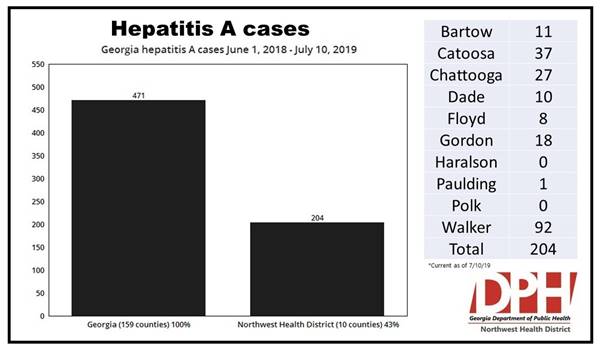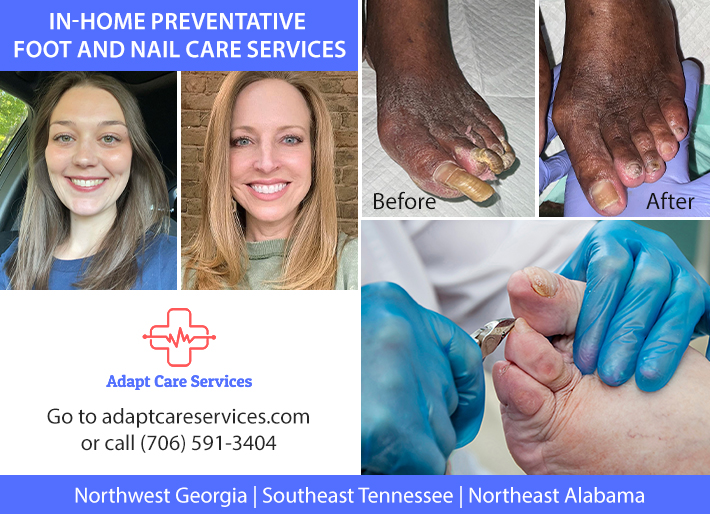
Public health officials have confirmed 27 cases of hepatitis A among Chattooga County residents since June 2018 and are urging vaccination against the highly contagious liver infection for people most at risk of the vaccine-preventable disease, especially illicit (injection and non-injection) drug users, individuals who have recently been in jail or prison, and their close contacts.
Officials are also encouraging all persons who work in food-service establishments, such as restaurants and cafeterias, to be vaccinated.
The Chattooga County Health Department, 60 Farrar Drive, Summerville, is offering free hepatitis A vaccinations during regular business hours. No appointment is needed.
The 27 hepatitis A cases have been confirmed in Chattooga County residents since a serious uptick in Georgia hepatitis A cases began last June. According to the CDC, Georgia is one of 18 states experiencing an outbreak of the highly contagious liver infection.
Since June 2018, 471 cases of hepatitis A have been confirmed statewide. Of these, 204 cases, 43% of the state total, have been in the ten-county Georgia Department of Public Health Northwest Health District, which includes Chattooga County. The health district normally confirms, on average, one case per year.
“Hepatitis A is spreading among Chattooga County residents,” said Dr. Zachary Taylor, interim health director for the Northwest Health District, “and we want to stop it here before it gets to the level we’ve seen in other Northwest Georgia counties. The best protection against hepatitis A is vaccination.”
Those most at risk of hepatitis A include:
- illicit (injection and non-injection) drug users,
- individuals who have a history of incarceration in jail or prison,
- men who have sex with men,
- close contacts of people with hepatitis A,
- homeless or transient individuals, and
- persons with close contact to someone with these risk factors.
“We urge individuals with one or more of these risk factors, especially illicit drug use, to get vaccinated,” says Dr. Taylor. “If you’ve had hepatitis A, you have lifelong immunity to the disease and do not need to be vaccinated. Also, since hepatitis A vaccination is required for school-age children born on or after January 1, 2006, these individuals do not need vaccination.”
“Adults should get the vaccine if they fit into one of these risk factors. If they don’t, their risk is so low that getting vaccinated is a matter of personal preference. If you are not sure whether you should get the hepatitis A vaccine, talk with your doctor about your specific concerns.”
The best way to prevent hepatitis A is to practice good hygiene, proper handwashing, careful and sanitary preparation of food, and by getting vaccinated against the hepatitis A virus.
The increase in Northwest Georgia hepatitis A cases, public health officials believe, is related to a hepatitis A outbreak in neighboring Tennessee that has sickened over 1,600 people since December 2017. “We noticed the spread of illness go across the state line from Tennessee into Georgia,” says Northwest Health District Epidemiologist Melissa Hunter, “and we’ve watched it move south, roughly following U.S. Highway 27, I-75, and their surrounding counties, propelled by illicit drug use, both IV and non-IV.”
Public health, of course, has done more than just monitor the southward movement of the disease, says Dr. Taylor. “We’ve responded to the outbreak by working with local healthcare providers and other community partners to educate and encourage vaccination for those in high-risk groups, we’ve held free-vaccination clinics at our county health departments, and we’ve worked with our jails and prisons to provide free vaccinations. Our environmental health inspectors have worked closely with managers and operators of food-service establishments to minimize the possibility of hepatitis A transmission from an infected worker to customers.”
What is hepatitis A? Hepatitis A is a vaccine-preventable, communicable disease of the liver caused by the hepatitis A virus. It is usually transmitted person-to-person through the fecal-oral route or consumption of contaminated food or water.
Most people who get hepatitis A feel sick for several weeks, but they usually recover completely and do not have lasting liver damage. In rare cases, hepatitis A can cause liver failure and death; this is more common in people older than fifty and in people with other liver diseases.
Most adults with hepatitis A have symptoms, which may include fatigue, low appetite, stomach pain, nausea, vomiting, diarrhea, dark-brown urine, light-colored stools, and jaundice, that usually resolve within two months of infection; most children less than six years of age do not have symptoms or have an unrecognized infection. A doctor can determine if you have hepatitis A by discussing your symptoms and taking a blood sample.
You should get hepatitis A vaccine if you:
- use illicit drugs,
- work in the food-service industry,
- are traveling to countries where hepatitis A is common,
- are a man who has sex with other men,
- have a chronic liver disease such as hepatitis B or hepatitis C,
- expect to have close personal contact with someone who is at risk of having hepatitis A.
Ask your healthcare provider if you want more information about any of these groups. There are no known risks to getting hepatitis A vaccine at the same time as other vaccines.
For more information about hepatitis A and free hepatitis A vaccinations, contact the Chattooga County Health Department at 706-857-3471 or visit https://nwgapublichealth.org
*as of 7/10/19
###
About the Chattooga County Health Department: The Chattooga County Health Department works to prevent disease, injury, and disability; promote health, safety, and wellbeing; and prepare for and respond to disasters, thereby improving the quality of life for individuals and families in Chattooga County. We provide a wide range of medical services, track and prevent the spread of disease, promote health and safety through education and communication, monitor area environmental safety, including restaurant and other food-service inspections, and ensure our community is prepared for public health emergencies. Find us on the web at www.nwgapublichealth.org/counties/chattooga
Follow us on Facebook to receive news, emergency messages, and health information at https://www.facebook.com/ChattoogaDPH












